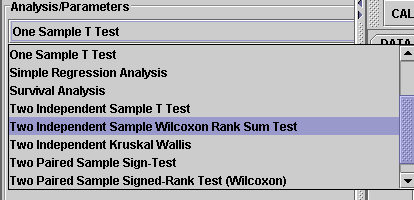Difference between revisions of "SOCR EduMaterials AnalysisActivities Wilcoxon"
(→SOCR Analysis Example on Wilcoxon Two Independent Sample Rank Test) |
(→SOCR Analysis Example on Wilcoxon Two Independent Sample Rank Test) |
||
| Line 1: | Line 1: | ||
| − | == | + | ==Two Independent Sample Wilcoxon Test Example== |
| − | |||
| + | We will demonstrate Two Independent Wilcoxon Test with a SOCR built-in example. | ||
This example is based on the data taken from "Mathematical Statistics and Data Analysis" by John A. Rice, Second Edition, Ducbury Press, 1995. (Page 390) | This example is based on the data taken from "Mathematical Statistics and Data Analysis" by John A. Rice, Second Edition, Ducbury Press, 1995. (Page 390) | ||
Note that this text book uses the data for a Two Independent T-Test but we're only taking the data to demonstrate the Wilcoxon Two Independent Sample Rank Test. | Note that this text book uses the data for a Two Independent T-Test but we're only taking the data to demonstrate the Wilcoxon Two Independent Sample Rank Test. | ||
| − | |||
| − | + | Here's the steps of the activity: | |
| + | |||
| + | '''1.''' Click on '''Two Independent Sample Wilcoxon Test''' at the left panel's combo box. | ||
| + | <center>[[Image:SOCR_AnalysisActivities_TwoIndepW_Chu_051707_Fig1.gif|700px]]</center> | ||
| + | |||
| + | |||
| + | <center>[[Image:SOCR_AnalysisActivities_TwoIndepW_Chu_051707_Fig1A.gif|450px]]</center> | ||
| + | |||
| + | |||
| + | On the right panel, first click on '''EXAMPLE 3''' and next click on "Data" to retreive the demonstrated example. This is the example we'll be looking at.Note that the data are difference of B - A. | ||
| + | |||
| + | <center>[[Image:SOCR_AnalysisActivities_TwoIndepW_Chu_051707_Fig2.gif|700px]]</center> | ||
| + | |||
| + | |||
| + | '''2.''' Click on the "'''Mapping'''" button to get to the "'''Mapping'''" panel. Click on '''"ADD"''' under '''VARIABLE 1''' and to '''VARIABLE 2''' add the variables for Two Independent Sample Wilcoxon Test. We care about the difference, so which on goes to '''VARIABLE 1''' is arbitrary. You can just add column '''A''' to '''VARIABLE 1''' and '''B''' to '''VARIABLE 2'''. | ||
| + | Here, the computer will set difference = Variable 2 - Variable 1. If you like the substraction to go the other way around, simple assign '''VARIABLE 1''' and '''VARIABLE 2''' in a different way. | ||
| + | |||
| − | [[Image: | + | <center>[[Image:SOCR_AnalysisActivities_TwoIndepW_Chu_051707_Fig3.gif|700px]]</center> |
| − | ''' | + | '''3.''' Click on "'''Calculate'''" then "'''Result'''" to see the results. |
| − | |||
| + | <center>[[Image:SOCR_AnalysisActivities_TwoIndepW_Chu_051707_Fig4.gif|700px]]</center> | ||
| − | |||
| − | + | '''Questions for students:''' By looking at the test results, what do you think about the data? What can you say about the two different shoe materials? | |
Revision as of 01:23, 5 August 2007
Two Independent Sample Wilcoxon Test Example
We will demonstrate Two Independent Wilcoxon Test with a SOCR built-in example. This example is based on the data taken from "Mathematical Statistics and Data Analysis" by John A. Rice, Second Edition, Ducbury Press, 1995. (Page 390)
Note that this text book uses the data for a Two Independent T-Test but we're only taking the data to demonstrate the Wilcoxon Two Independent Sample Rank Test.
Here's the steps of the activity:
1. Click on Two Independent Sample Wilcoxon Test at the left panel's combo box.


On the right panel, first click on EXAMPLE 3 and next click on "Data" to retreive the demonstrated example. This is the example we'll be looking at.Note that the data are difference of B - A.

2. Click on the "Mapping" button to get to the "Mapping" panel. Click on "ADD" under VARIABLE 1 and to VARIABLE 2 add the variables for Two Independent Sample Wilcoxon Test. We care about the difference, so which on goes to VARIABLE 1 is arbitrary. You can just add column A to VARIABLE 1 and B to VARIABLE 2.
Here, the computer will set difference = Variable 2 - Variable 1. If you like the substraction to go the other way around, simple assign VARIABLE 1 and VARIABLE 2 in a different way.

3. Click on "Calculate" then "Result" to see the results.

Questions for students: By looking at the test results, what do you think about the data? What can you say about the two different shoe materials?